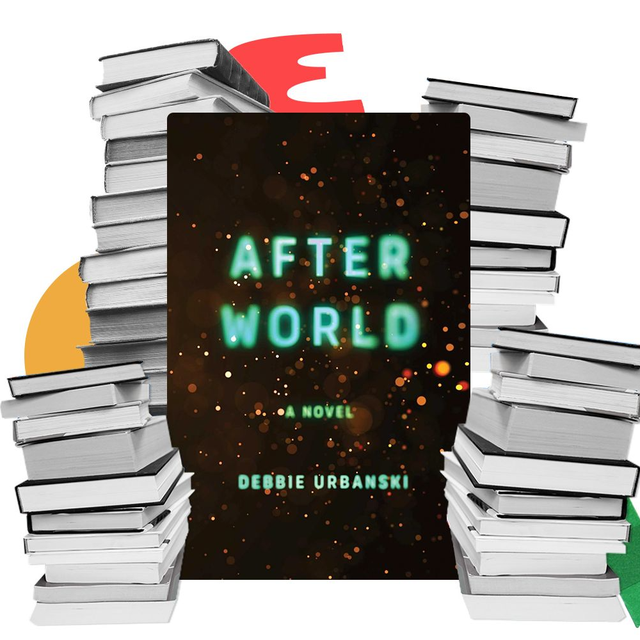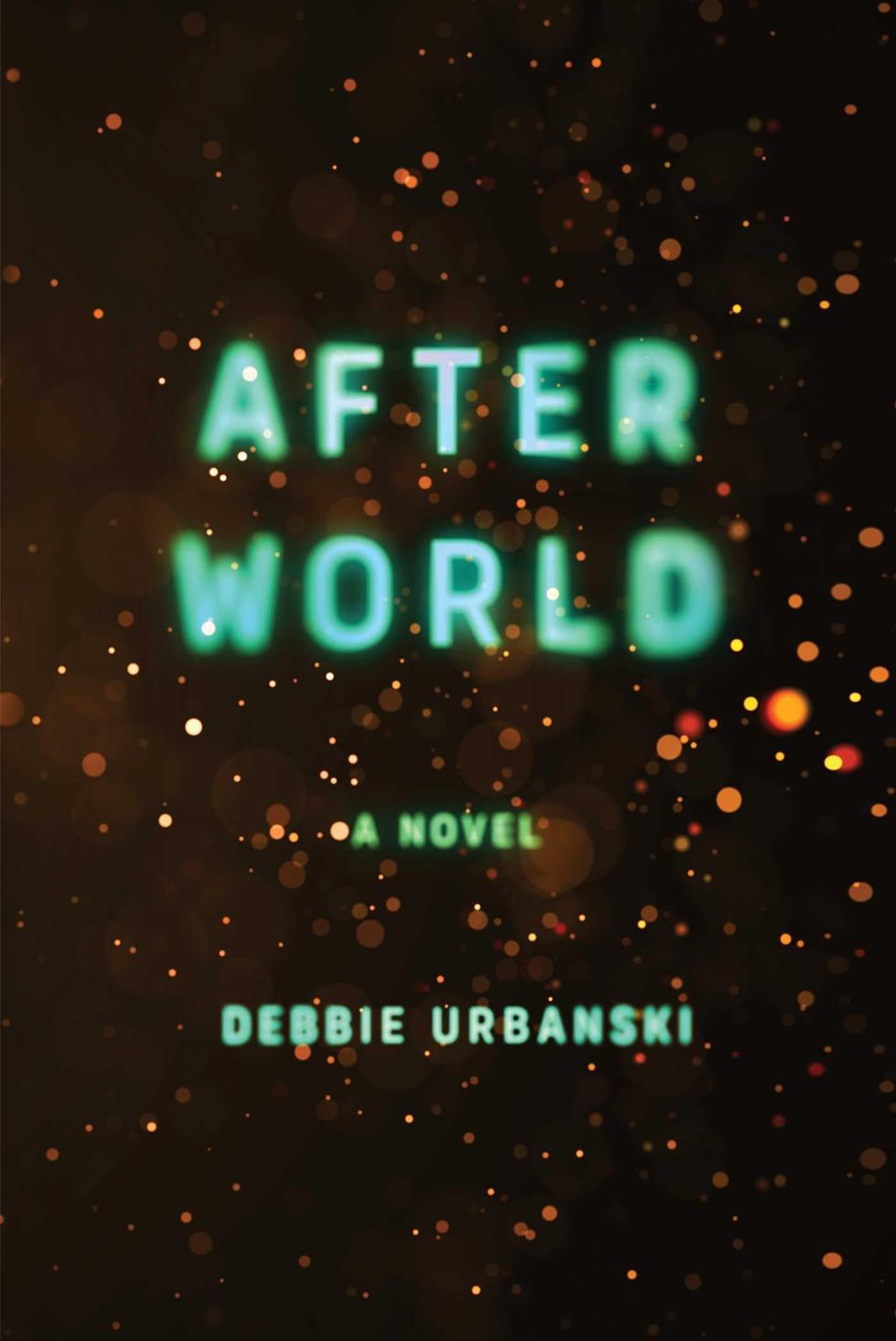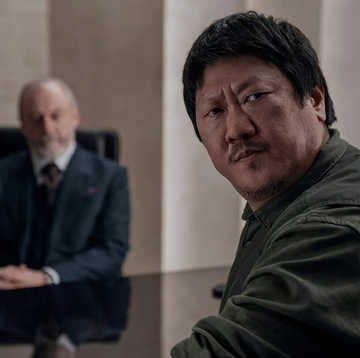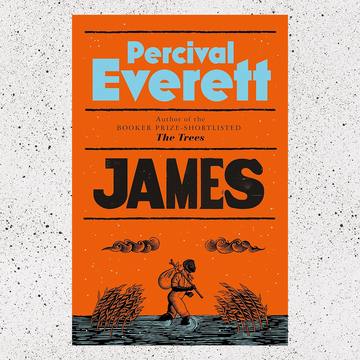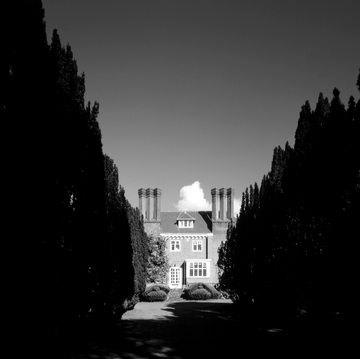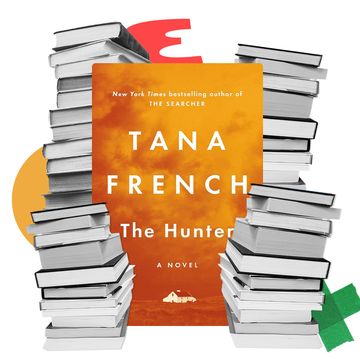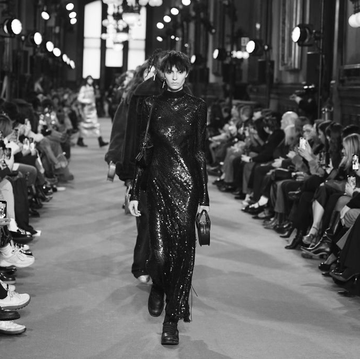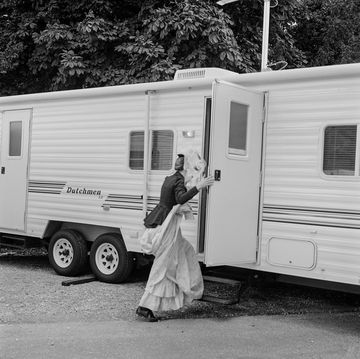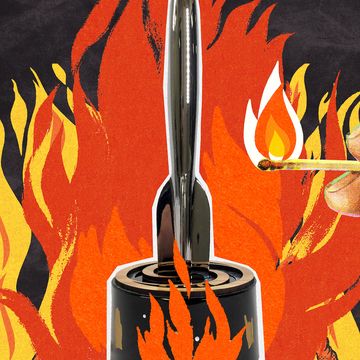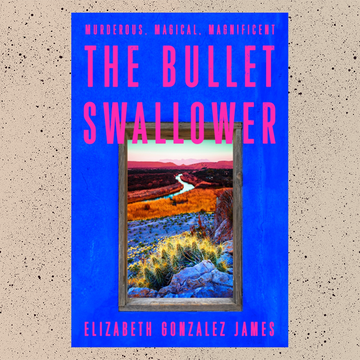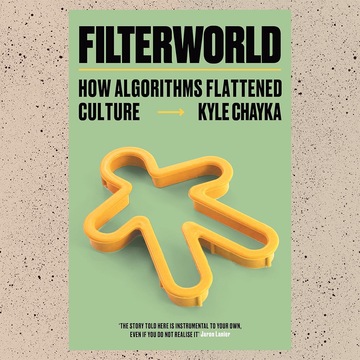On the day of the 2017 solar eclipse, Debbie Urbanski was hiking in the Adirondacks, as she often did, when, coming down from Algonquin Peak, she slid down the trail and broke her leg. Lying there in excruciating pain, waiting to be helicoptered to safety, she looked around at the mountains and realised they didn’t care. “They didn't care that I had broken my leg. They weren't even aware of me,” she told Esquire. “That was a very different feeling from before, when I would just hike joyfully through the mountains and feel very safe. All of a sudden, the natural world felt very other. I think that was a good realisation.”
In Urbanski’s debut novel, After World, nature certainly doesn’t give a hoot about us. Narrated by an artificial intelligence, [storyworker] ad39-393a-7fbc, the novel follows Human 2272696176, also known as Sen Anon, who is the last living human on Earth. Sen has been tasked by the Department of Transition to witness and record the rewilding occurring around her. “She is to do this job,” [storyworker] tells us, “for 1,396 more days until her resource consumption and unintended harm to the planet outweigh the long-term benefits of her witnessing.” In After World, (29) Human extinction was planned, and is in its final stages. Over the course of the book, as readers learn more about what’s happened to the rest of humanity, [storyworker] watches Sen’s final days on the planet over and over again. It stays deeply invested in Sen’s life and death, to the point where it begins to care about her. If the last human being dies, but an AI keeps telling their story, are they really dead?
Urbanski spoke to Esquire by Zoom about the novel’s genesis, artificial intelligence, human extinction, motherhood, coexisting with nature, and more. This interview has been edited for length and clarity.
ESQUIRE: How did you come up with the idea for After World? Where did it begin for you?
DEBBIE URBANSKI: Back in 2015 or so, I had started reading about extinction and climate change. Elizabeth Kolbert’s The Sixth Extinction had come out—such an amazing book, I just started rereading it again, and it's just a heartbreaker. My family and I, we're all hikers. We're in the woods a lot. So I had a really emotional reaction to the idea that we're losing all these species—some species that we don't even know.
In The World Without Us, Alan Weisman interviewed someone who brought up human extinction in the context that all species eventually go extinct. Humans are going to go extinct too, and it was no big deal to him. He took it in stride; he was thinking in geologic time. So that gave me the idea of playing around with human extinction in particular.
I also really love post-apocalyptic novels. I've always been a little uncomfortable with how much I enjoy them and how fun they are—how it's such an adventure. I read a lot of them with my son, who's now a teenager. I really enjoy writing in genre, but also challenging some genre conventions. I find it really fun to push up against that. So all of that turned into this book.
Emily St. John Mandel’s Station Eleven is mentioned specifically several times in the book—are you a fan?
I loved that one. It felt like a breakout novel for the genre, where people who had never read post-apocalyptic novels were suddenly taking it seriously. Everyone I know read the book. At the same time, I enjoyed writing against it in some ways, because it is a hopeful book and it's really humanity-centred. So I was trying to do the opposite.
After World is narrated by a far more advanced artificial intelligence than what we have now, but in your acknowledgements, you thank several current generative AI programs. How did you use our present-day AI for inspiration?
I brought AI into the novel in 2019, I think. So it was before we really got a chance to play around with ChatGPT. I brought in AI because I needed a narrator who could narrate the end of humanity, and I loved that AIs are made by humans. I thought it was circular.
When I was able to get access to GPT, it was so exciting and mind-blowing. I hadn't expected to be able to use that—well, I also assumed my novel would be done sooner than it actually was, so the fact that it dragged out was a bit helpful. I got early access to GPT-3; I had to apply and was on a waitlist. And that was just funny and fun. It was at a stage where its responses were very not human. I was trying to pick its brain for titles and they were funny; they'd go on for sentences or it would get obsessed with one particular aspect of the book, like Eve or Eden. I tried to explain, that’s not really in the book, but it wouldn't understand. It kept going back [to those words]. So I was able to recognize its limitations pretty easily.
Then when ChatGPT came out, at first it didn't have so many guardrails. I was able to get more surprising human-like responses instead of how now it often says, “I'm an AI; I don't have personal feelings.” Before all the talk on hallucinations came out—that's when the AI makes stuff up and pretends it's true—I hadn't realised it was going to start doing that. I was trying to get post-apocalyptic quotes from books, and it started making up quotes and attributing them to, like, Cormac McCarthy’s The Road. But the quotes were about self-help! How I used it more seriously though—I found it really useful in copy-editing and asking grammar questions. Even where the placement of a comma was. Sometimes I couldn't articulate what would be the difference if I had a comma here or here, and it was really thoughtful in saying, “This is how the meaning changes.” I tried having it write poetry, which didn't work.
Yeah, it writes such bad poetry.
It always rhymes, right? No matter how you ask. Which is somewhat comforting, to find that poetry... that we own it as humans, you know? I used it for smaller stuff to brainstorm. I did include some actual writing from GPT in the book. There's what came out when I asked who it would pray to, and it just rattled off a 50-line poem—or I don't know what it is—but it was kind of lovely. So I used that.
[storyworker] ad39-393a-7fbc comments sometimes on post-apocalyptic or cli-fi novels. It also comments on its own cliches, common writing patterns, or rules it’s adhering to, such as how you shouldn’t have a long flashback early in a book. How and why did you decide to include [storyworker] meditating on the project as it went along?
I wanted there to be some development on [storyworker]'s behalf. At first I was trying to have it learn to write, which was fun for me, but not as much fun to read. I also included some things I was told that I couldn't do, but that I was doing; using [storyworker] as a narrator allowed me to push against editorial feedback by having it say, I'm doing this and this is why.
After World cares deeply about the environment and critiques our anthropocentric view of the world around us. At the same time, it's also a book that loves human beings so much that the AI narrator begins to shape itself into a version of one. How do you navigate that tension between those two loves, as both an environmentalist and a writer?
I'm thinking about my next novel idea, and one thing I can't figure out is how to tell the story of another species or the world while getting as far away as possible from the human perspective. That’s because I'm human, and the novel would probably need to be in words. I think that tension is really inherent to the fact that I am who I am: I use words and words are human, human-centric. I'm reading An Immense World by Ed Yong, and he talks about how language prioritises our visual senses because as humans, we're so visual. We just don't have a lot of words to distinguish smells.
I think that's what I loved about having the AI narrator. It did allow me to get outside of the human perspective. As you noticed, that AI wants to be human-like, and I think that’s maybe because there’s still something wonderful about human stories, no matter how destructive humans are in the big picture. I guess if you study any species, you’re going to fall in love with them, I would think. It's complicated, that tension. It's at the heart of a lot of what I'm thinking about right now. I do wonder—would the earth be better off without humans? That’s a question I thought about seriously while I was writing this. We’d lose so much, right? But then, so many species would be happier.
There’s another theme running through the book: motherhood. Sen’s mothers are crucial to the narrative, both as real mothers and then as ghosts. Even [storyworker] begins to think of its administrator, Emily, as a kind of mother. [storyworker] also points out that the only role mothers are allowed to have in so many books in this genre is this self-sacrificial one, but Sen’s mothers are way more complex. What about this theme is important to you?
When I started writing this novel, I was pretty severely depressed and I wasn't yet medicated. I was working with a therapist, and a lot of what we talked about was a mother's responsibility to their kids. I had a lot of suicidal ideation, and she was trying to tell me my kids would be devastated. I just had trouble believing that.
I was interested in the relationship where a mother could really love her children, and at the same time need to leave. The mothers who do choose to exit [in the novel]—it's just that their pain has gotten too great. So I was interested in exploring that. I wanted to have mothers who left their children. I wanted to ask: is that abandonment? Is that okay? What's the reaction of the kid? Why? How did the mothers justify that? I wanted to work through some of my own feelings about motherhood, too. While I was editing this novel, I was on medication, so I still had a lot of interest in it, but maybe from a more reserved stance.
You’ve thought a lot about the future, and about at least one potential version of it. So do you have hope for human beings? For the earth? For our coexistence?
There’s a book called I Want a Better Catastrophe, by Andrew Boyd. His theory is that a catastrophe is going to happen, but we can make the catastrophe better or worse by what we do. I think that captures my feelings. There's wishful thinking: wouldn't it be nice if we made all the changes we need to make to preserve the world and as many species as possible? Maybe we could if the goal wasn't to preserve a way of life, but to preserve the world, or think of a new way of life, a less destructive way of life… but it doesn't seem like that's happening. And that saddens me. How we're imagining the future seems to be like how we are now, only we're not on the coasts, or we have sea walls, or there are a lot of technology solutions.
But the next generation of kids—like my kids, who are teenagers—are growing up in such a different world with such different awareness and priorities. I didn't start thinking about climate change until… was it 2015 when I started reading about this? I know the science was out there—I just didn't have it at my fingertips. So I'm hopeful for this next generation, I really am. I feel like they're going to make better decisions, kind of because they have to. How we're living now is less ingrained. They might have better imaginations than we do about imagining how we could coexist [with the earth].
Amid climate grief and climate anxiety, which sit unfortunately alongside climate change denialism, how do you cope with the responsibilities that we have as stewards rather than owners of the environments we exist in?
On a very micro, personal level, I started trying to identify species of plants and insects. There's a great app called Seek, tied to iNaturalist. Once I started doing that, my vision just shifted and I was suddenly aware—there's so much life and diversity everywhere! I'd been hiking for decades before that, but starting to pay attention to plants was really cool. I have a macro lens on my camera, so when I started looking at things close up, that was another vision shift. It made me think: the natural world is so amazing! Not that this has accomplished anything in the big picture, but it did shift my thinking of how important the natural world is and how important things I walked by every day are. I can no longer kill ants in the house once I looked at them close up; I have to usher them out. We have a spider living outside of our house, creating this huge web, but I feel like I can't do anything about it, because the web is so amazing. I looked at it close up. He kind of greets me when I open the door now, and I'm just trying to be okay with that coexistence on a smaller level.
On a bigger level—one idea in I Want a Better Catastrophe is that we all have different roles to play. One of those roles is the artist. And that, for me, seems right. Writing this book, for instance, and talking about it. That was a way for me to maybe contribute to a potential shift in how we see the world.
Ilana Masad is a writer of fiction, nonfiction, and criticism; holds a PhD from the University of Nebraska-Lincoln; and is the author of the novel All My Mother's Lovers.
